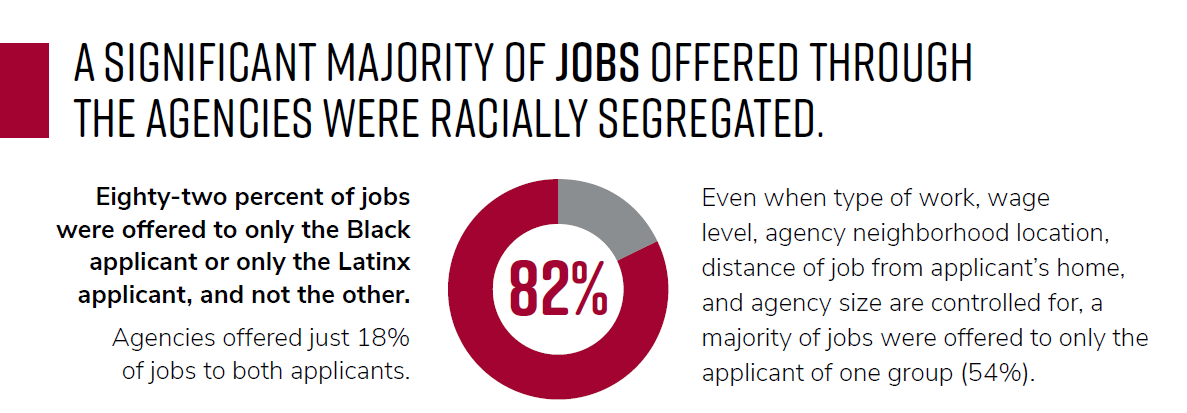ERC Employment Testing Investigation Exposes Widespread Discrimination at Staffing Agencies
By Elias Cohn
March 24, 2021
On February 23rd, Temp Worker Justice and Partners for Dignity and Rights (PDR) released a report based on the ERC’s employment testing investigation of industrial staffing agencies (also known as “temp agencies”) in the Chicago Metropolitan Area. The ERC’s groundbreaking investigation, conducted in cooperation with Partners for Dignity and Rights and the Chicago Workers’ Collaborative, revealed widespread racial discrimination against African American job applicants as well as hiring practices that deprived job opportunities to both African American and Latinx job applicants.
Industrial Staffing Agencies and Workers’ Rights:
Industrial factories and warehouses in the Chicago Metropolitan Area employ about 775,000 people and provide an important source of jobs to workers who lack post-secondary education and specialized training.[1] In many of these facilities, workers process and ship essential goods including food, medicine, and hygienic products to grocery stores, restaurants, and retailers throughout the country. Over the past three decades, many companies in this sector have moved away from hiring laborers directly and instead have increasingly relied on workers employed through independent staffing agencies.[2] [3] These companies say they have adopted this model to allow both workers and employers more flexibility to adapt to changes in the labor market. However, workers and labor advocates around the U.S. have shown that employers often use staffing agencies to shield themselves from liability for exploitative labor practices, prevent workers from organizing, and create a class of “permanent temporary workers,” who are more vulnerable to all kinds of abuse, including discrimination, wage theft, and harassment, than full-time employees.[4]
For years, temporary workers have reported flagrant incidents of hiring discrimination on the bases of race, gender, national origin, and other factors at industrial staffing agencies in Chicago and other areas of the U.S. Some of these claims have been substantiated by investigative journalists,[5] documents revealed through litigation,[6] and “whistleblower” testimony[7] from staff working at the agencies. However, in many cases, workers lack the information and evidence to prove that they were discriminated against.
Matched-Pair Testing and Proof of Widespread Discrimination:
Elias discussed the investigation methodology on a webinar announcing the release of the “Opening the Door” report.
The ERC’s investigation broke new ground by using matched-pair testing to systematically investigate the prevalence of racial discrimination throughout Chicago’s industrial staffing sector. With the help of local labor organizers, the ERC recruited and trained a team of experienced light industrial factory and warehouse workers to work as testers and conducted matched-pair tests at a randomly selected sample of 60 staffing agencies. Because organizers in Chicago reported that agencies routinely segregate job offers between African American and Latinx workers, each matched pair consisted of one Latinx tester and one African American tester.
As the recently released report shows, ERC’s investigation found that:
- Over 1/3 of agencies (38%) discriminated against African American job applicants, unlawfully depriving them of job opportunities. Overall, African American applicants were offered jobs at 75% the rate of Latinx applicants (p<.01). The rate of discrimination against African Americans was even higher in predominantly Latinx neighborhoods, where 70% of agencies found through random sampling were located.

- 82% of job assignments were “segregated,” meaning that some were only offered to a Latinx tester while others were only offered to an African American tester, even though both testers were equally qualified (p<.01). This process of “steering” certain job applicants into certain jobs based on their race is illegal, deprives both African American and Latinx job applicants of work opportunities, and creates racially segregated job sites where workers are more vulnerable to other kinds of abuse.

The report provides both statistical evidence that discrimination is widespread at Greater Chicago’s staffing agencies and detailed summaries of specific tests that demonstrate what discrimination at staffing agencies “looks like.” It includes examples of agencies that turned away applicants based on race, and examples of agencies that steered applicants of different races into different jobs. These findings lend important credibility to the claims workers and labor advocates have been making for years.
The report release was covered by the Chicago Tribune, WBEZ, and Telemundo. It has also received attention from labor organizers around the US who are leveraging the ERC’s findings to advocate for more accountability and monitoring of staffing agencies to protect workers and prevent further discrimination and abuse.
Read the full report: Opening the Door: Ending Racial Discrimination in Industrial Temp Hiring Through Innovative Enforcement
References:
[1] CMAP. (2020) . Cluster employment and location quotient. Chicago Metropolitan Agency for Planning: https://www.cmap.illinois.gov/programs/regional-economic-indicators/clusters
[2] Weil, D. (2014). The Fissured Workplace. Harvard University Press: https://www.hup.harvard.edu/about/ebooks-and-digital-products.html
[3] “Manufacturing’s Temporary Worker Boom.” Industry Week, 2015: https://www.industryweek.com/talent/article/21966710/manufacturings-temporary-worker-boom
[4] “Lasting Solutions for America’s Temporary Worker’s.” National Employment Law Project, 2019: https://s27147.pcdn.co/wp-content/uploads/Lasting-Solutions-for-Americas-Temporary-Workers-Brief.pdf
[5] “Kill bill: How Illinois’ temp industry lobbying quashed reform:” Reveal News, 2016. https://revealnews.org/article/kill-bill-how-illinois-temp-industry-lobbying-quashed-reform/
[6] See, for example, Mendez v. ASG Staffing: https://www.documentcloud.org/documents/1688489-mendez-v-asg-staffing.html
[7] See, for example, Hunt v. Personnel Staffing Group: https://www.courtlistener.com/docket/5642529/hunt-v-personnel-staffing-group-llc/
———
The Equal Rights Center (ERC) — a national non-profit organization — is a civil rights organization that identifies and seeks to eliminate unlawful and unfair discrimination in housing, employment and public accommodations in its home community of Greater Washington DC and nationwide. The ERC’s core strategy for identifying unlawful and unfair discrimination is civil rights testing. When the ERC identifies discrimination, it seeks to eliminate it through the use of testing data to educate the public and business community, support policy advocacy, conduct compliance testing and training, and, if necessary, take enforcement action. For more information, please visit www.equalrightscenter.org.

